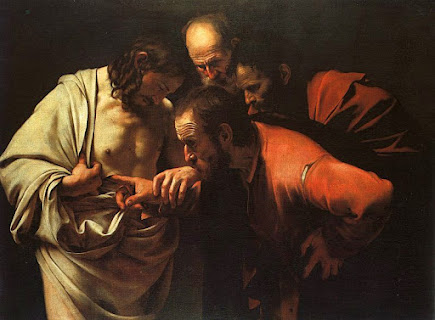God so loved the world that he gave his only-begotten Son,
so that everyone who believes in him might not perish
but might have eternal life.
This passage is popular for a reason. It has the potential to clear up so many misconceptions about Christianity. It is antithetical to the idea that Christianity is something we do to appease an imperious or angry God who is largely indifferent to our plight. It is not actually, primarily, about what we do for God at all, but rather, what he has done for us in Jesus Christ.
For God did not send his Son into the world to condemn the world,
but that the world might be saved through him.
Many people seem to think that Christians believe in an angry God who wants to condemn the world, only occasionally giving a pass to those who follow a list of arbitrary rules, worshiping him to stoke his ego, or provide some other benefit to him. The fact that one of the few things remembered in the religious history of our country is that Jonathan Edwards once wrote a sermon called "Sinners in the Hands of an Angry God" probably doesn't help. But these presuppositions forget that God has always said, "I have no pleasure in the death of the wicked" (see Ezekiel 33:11). This is consistent in Saint Paul as well, who writes of "God our Savior, who desires all people to be saved and to come to the knowledge of the truth" (see First Timothy 2:3-4). But if teaching wasn't enough to prove the sincerity of God's position, nothing could surpass the giving of his only Son for the salvation of the world. God's purpose was not condemnation and never was. It was always to save as many as possible. But why, someone may ask, not everyone? To which we give a three part answer. First, salvation means living in an exchange of love with God and all of those united to him for all eternity. Second, love cannot be forced. Third, we tend to prefer just about anything else over the demands of love.
Whoever believes in him will not be condemned,
but whoever does not believe has already been condemned,
because he has not believed in the name of the only-begotten Son of God.
In our fallen world love is not the default position, but rather selfishness. This is why our default situation is not salvation, but condemnation. If we insist on pursuing that path to its end, if we insist on rejecting love, we will eventually find ourselves in the place that is the antithesis of love, which is hell itself. But we cannot rise to the level of God's kind of selfless agape love on our own. We are too much trapped by our own egos. And beyond that there are powerful forces working against us to make sure we stay confined in those pitiful little prisons. Thus it is all dependent on our response to God's rescue mission. The coming of Jesus into our world demands a response from all who come to know about him. Accepting Jesus is how we give our 'Yes' to God and all he desires for us. Rejecting the one sent to save us is like spitting in his face, just as some did during the trial of Jesus (see Mark 14:64-66). What could be more sad than hardening our hearts to the outstretched arms of love?
And this is the verdict,
that the light came into the world,
but people preferred darkness to light,
because their works were evil.
The difficulty with salvation is that it brings light to the dark places within our hearts. It is a trivial thing for us, and something we even tend to celebrate, to bring light to the dark places in our society and in the world around us. But we hate to admit there is anything wrong with us, even to ourselves. We're more cynical about it now, but we still tend to believe at least the first half of 'I'm OK - You're OK', just as much as anyone in 1967. We have internalized the part of it that conveniently reinforced the story we wanted to tell and to believe about ourselves.
What we need to realize is that the light doesn't shine to expose us, or to delight in our faults. It shines to illuminate, and to cast out the darkness. Basically all that is asked of us is that we don't run from it, that we too might find ourselves in light and no longer in darkness.
He has delivered us from the domain of darkness and transferred us to the kingdom of his beloved Son (see Colossians 1:13).
It's all about love. Sometimes love has to be tough love. But God himself bore what was most difficult, in order to help and to entice us to come to him. So let the light shine. And let us run into the outstretched arms of love.









_-_WGA00542.jpg)




.jpg)
